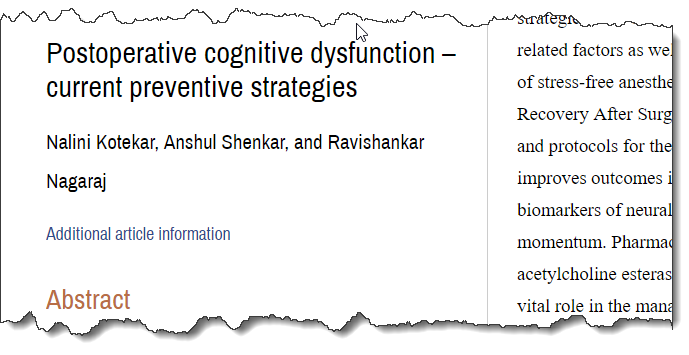
Here’s what the doctor didn’t warn you about…
—-Important Message—-
Fighting brain fog? This gives men more focus and energy (especially in bed)

I’ve discovered that most men suffering from brain fog have low brain blood sugar.
Low brain blood sugar zaps men of their natural energy and stamina, especially in the brain…
It creates that sluggish, tired all the time feeling.
And since the brain needs so much sugar to function, brain fog is one of the first symptoms to show up in men with low brain blood sugar.
And you know what the next most common symptom is in men? “Rockiness” problems, believe it or not!
Men with low brain blood sugar have a difficult time getting rocky and performing with a woman.
And it all goes back to low brain blood sugar…
———-
Beware this long-lasting side effect
A very real problem with surgical procedures is that they can cause brain fog for days, weeks, or months afterwards.
Or even for years afterwards.
It’s due to a hidden danger of anesthesia.
I had one friend who says that she was never quite the same after anesthesia.
But the reality is there are a few things you can do to minimize your risk — including making sure you are getting the right treatment for anesthesia.

What is Postoperative Cognitive Dysfunction?
Postoperative Cognitive Dysfunction, or POCD, is the brain fog that people experience after surgical anesthesia.
Cognitive disorders common in the post-operative period, are the post-operative delirium (POD) and the post-operative cognitive dysfunction (POCD).
POCD can affect focus as well as memory.
POCD is defined by a range of changes in neurocognitive patients’ condition and behaviour, for weeks or even months after anaesthesia and operation. Usually, these problems concern difficulties in cognitive processes that patients were doing before operation, i.e. to focus on their work.
The question is, can you prevent POCD if you have to go in for surgery?
If you understand the treatments that they use for anesthesia, then the answer is yes, you can help yourself by choosing the right treatments.
What Is the Underlying Cause of POCD
Scientists think the cause of POCD is an inflammatory response in your brain.
Though the precise etiology of POCD is yet to be understood, the underlying biological basis is believed to be a cholinergic failure within the central nervous system (CNS), and the cluster of symptoms is very similar to Alzheimer’s form of dementia. This is thought to be the result of a malignant neuroinflammatory response.
That means that in addition to choosing the less risky treatment — you can also be proactive with your diet BEFORE surgery in order to help mitigate the inflammation response.
I find that when you treat internal inflammation as the systemic issue it is, then you have less overall problems with your health…
…including the potential to reduce POCD.
You Have to Have Anesthesia During Surgery
Now, back to the options for surgery.
You can’t do surgery without anesthesia, but anesthesia is directly related to POCD and can have massive short and medium term impacts on your brain function.
That’s why it’s important to choose the RIGHT treatment for anesthesia.
Propofol Anesthesia Has a Lower Incidence of Short Term Cognitive Dysfunction
There is some evidence that propofol has a much lower rate of causing POCD than treatments in the dexmedetomidine and midazolam groups.
In all, 60 of 164 patients (36.6%) were diagnosed with POCD 7 days postoperatively, POCD incidence in propofol group was significantly lower than that in dexmedetomidine and midazolam groups (18.2% vs. 40.0%, 51.9%, χ = 6.342 and 13.603, P = 0.012 and < 0.001). When the patients were re-tested 1 year postoperatively, the incidence of POCD was not significantly different among the 3 groups (14.0%, 10.6% vs. 14.9%, χ = 0.016 and 0.382, P = 0.899 and 0.536).
But.. if you are going in for surgery, they aren’t likely to tell you the treatments they are going to use for anesthesia.
That’s why it’s up to you to ask.
Knowing what treatments you are being given and asking for an alternative with fewer side effects is really going to be up to the patient.
Doctors aren’t likely to tell you because they simply don’t know.
So, if you are going in for surgery, do your research and advocate for yourself.
I also suggest plenty of orange juice, milk, eggs and ripe fruit…as these are anti-stress foods.
—-Important Message—-
Massive Breakthrough: More powerful than testosterone…THIS is giving men “rocky ones” again when nothing else works…
There’s a secret condition that makes normal “rockiness” treatments useless on men…
A condition that doctors have forgotten, and medicine won’t fix.
So if you have been suffering from poor “rockiness” or no “rockiness” at all, this will be life-changing for you.
This actually works…
Because this discovery does help restore great “rockiness.” No matter how long it’s been.
And get this — it can also make you grow thicker and fatter “down there” naturally…

———-
